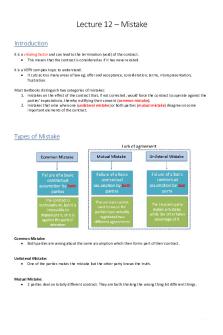Contract Law - Doctrine of Mistake PDF

| Title | Contract Law - Doctrine of Mistake |
|---|---|
| Course | Contract Law |
| Institution | The University of Warwick |
| Pages | 2 |
| File Size | 156.6 KB |
| File Type | |
| Total Downloads | 77 |
| Total Views | 160 |
Summary
Overview of the doctrine of mistake in the context of contract law, as taught by Professor Christian Twigg-Flesner...
Description
Doctrine of Mistake - Two instances of mistake: • Offer and acceptance mistake (or unilateral mistake) • Common mistake - Offer and acceptance mistakes: • Parties at cross-purposes: - The courts apply an objective test to see if the
•
•
contract can be saved, i.e. - would the reasonable person looking at the correspondence between the parties have understood the contract to have a single meaning? If yes, the contract can be found to be valid and vice versa - Raffles v Wichelhaus: one believed cotton should be shipped in October whilst the other believed it should be shipped in December. Wasn’t clear which it should actually be, so contract was void. Terms of the Contract: - Smith v Hughes - Hartog v Colin and Shields - Chwee Kin Keong v digilandmall.com Identity of the contracting party: - For face to face dealings, it is presumed that the party wishes to enter into a contract with the person directly in front of them, the fact that they lie about their identity does not matter • Phillips v Brooks: Attempted to sue person who bought jewellery from them for tort of conversion (to get value for jewellery person sold) because he lied about his identity and the check for the name he used bounced. To do this, had to prove that the contract was void because of the misrepresentation - found that the contract was not void because the shop wanted to enter a contract with the person in from of them, even if he lied (so was only entitled to what was owed). • Ingram v Little: ‘Has it been sufficiently shown that, contrary to the prima facie presumption, a party was not contracting with the physical person to whom he uttered the offer, but with another individual whom…he believed to be the physical person present?’ • Lewis v Averay - Where the parties are not physically present when the contract is made, the courts will only make a finding of mistake if the claimant can clearly identify a person or business (that actually exists) that they intended to do business with, but didn’t because they had a false belief. Merely describing attributes doesn’t suffice. • Cundy v Lindsay: If the rogue (person lying about their identity) has nothing to do with the company that’s contracting, and the other party agreeing has heard of/is familiar with the company, then contract is void • Shogun v Hudson
- Common mistake: • If the decision to enter into a contract was based on a common assumption which the parties later
•
realise was incorrect, the contract may be set aside. The mistake in question must be fundamental - Bell v Lever Brothers Ltd: ‘must relate to something which both parties must necessarily have accepted in their minds as an essential element of the agreement’ - mistake in this case was not considered as fundamental because the primary focus of the agreement was restructuring the company, not paying the money (Credit du Nord) • Case established a very narrow doctrine of mistake in law - Solle v Butcher: discovered wider doctrine of mistake in equity, ‘court can step in whenever it is of the opinion that it is unconscientious for the other party to avail himself of the legal advantage which he has obtained’ - Great Peace v Tsavliris Salvage: Overturned Solle v Butcher declaring that there can be no doctrine of mistake in equity based on this because it overstepped and Parliamentary legislation is necessary to introduce such a rule where mistake can be found in the terms Common assumptions which could be found to be incorrect, meaning the contract may be set aside:
1. Mistake as to the existence of Subject Matter • Galloway v Galloway • Couturier v Hastie • Associated Japanese Bank v Credit du Nord 2. Mistake as to possibility to perform • Physically impossible to perform contract (Shiek Bros v Ochsner) • Legally impossible to perform contract (Cooper v Phibbs) • Commercially impossible to perform contract (Griffith v Brymer) 3. Mistake as to Quality • Leaf v International Galleries • Harrison and Jones v Burton and Lancaster • Oscar Chess v Williams • Requirements if common mistake is to void a contract (Great Peace Shipping v Salvage) - there must be a common assumption as to the existence of a state of affairs - there must be no warranty by either party that the state of affairs exists - the non-existence of the state of affairs must not be attributable to the fault of either party - the non-existence of the state of affairs must render performance of the contract as impossible
- In any event, the doctrine of mistake only deals with misapprehensions AT THE TIME the contract was concluded, not with subsequent events (Brennan v Bolt Burdon)
- Remedies: • Mistake usually renders a contract as void • However, may be equitable rectification of a unilateral mistake in a written contract in some
• •
circumstances (essentially where one party is aware of the mistake made by the other party and doesn’t attempt to rectify this mistake because it benefits them not to) - Thomas Bates v Wyndham’s Ltd - Commission for the New Towns v Cooper No damages for mistakes available Possibility to rectify contract if necessary (Rose v Pim Junior and Co) - Side note: English law makes it fairly easy to escape a contract by paying damages, the remedy of special performance is only reserved for very specific circumstances...
Similar Free PDFs

Mistake - Summary Contract Law
- 6 Pages

MISTAKE OF LAW VS MISTAKE OF FACT
- 14 Pages

Law of contract-1 - Law of Contract
- 48 Pages

Contract Law - Types of Contract
- 8 Pages

Law of contract
- 38 Pages

Law of Contract
- 23 Pages

mistake crim law
- 3 Pages
Popular Institutions
- Tinajero National High School - Annex
- Politeknik Caltex Riau
- Yokohama City University
- SGT University
- University of Al-Qadisiyah
- Divine Word College of Vigan
- Techniek College Rotterdam
- Universidade de Santiago
- Universiti Teknologi MARA Cawangan Johor Kampus Pasir Gudang
- Poltekkes Kemenkes Yogyakarta
- Baguio City National High School
- Colegio san marcos
- preparatoria uno
- Centro de Bachillerato Tecnológico Industrial y de Servicios No. 107
- Dalian Maritime University
- Quang Trung Secondary School
- Colegio Tecnológico en Informática
- Corporación Regional de Educación Superior
- Grupo CEDVA
- Dar Al Uloom University
- Centro de Estudios Preuniversitarios de la Universidad Nacional de Ingeniería
- 上智大学
- Aakash International School, Nuna Majara
- San Felipe Neri Catholic School
- Kang Chiao International School - New Taipei City
- Misamis Occidental National High School
- Institución Educativa Escuela Normal Juan Ladrilleros
- Kolehiyo ng Pantukan
- Batanes State College
- Instituto Continental
- Sekolah Menengah Kejuruan Kesehatan Kaltara (Tarakan)
- Colegio de La Inmaculada Concepcion - Cebu








